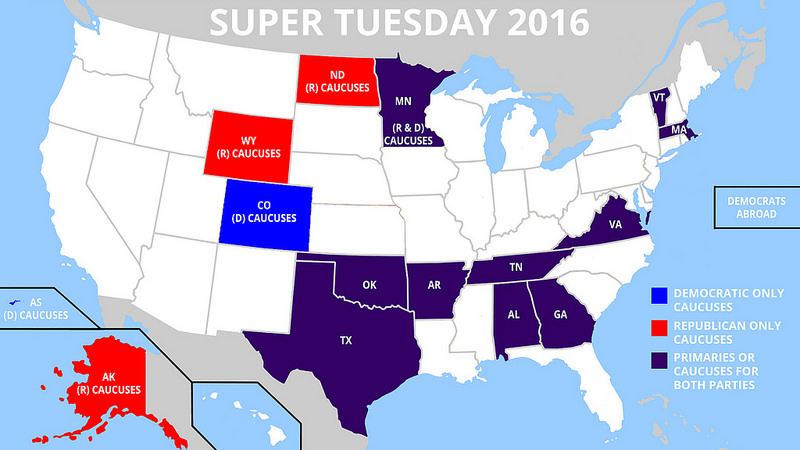
It’s a make-or-break day for U.S. Presidential hopefuls and one of the most important dates in any U.S. presidential race. So how did Super Tuesday start and why is it so important?
Every four years, Super Tuesday takes place on a Tuesday in either February or March during the U.S. Presidential race. Super Tuesday is the day when both Democrats and Republicans hold the most number of primaries of the election season.
This year, Super Tuesday takes place on March 1, 2016 and sees delegates from thirteen states and one territory casting their nomination for their preferred candidate to content the U.S. Presidential election.
Each state handles the voting process differently: some are primaries, which are run by the states; others are caucuses, which are typically put on by the state parties.
Due to the high number of primaries being held on one day, Super Tuesday can ultimately determine who each of the party’s nominees will be for the Presidential race. For instance, in 2016, a Republican candidate will need 1,237 delegates to secure the party’s nomination; Super Tuesday gives Republican candidates the opportunity to secure about half of that total amount. Similarly, Democratic candidates have the opportunity to secure roughly one third of the total nominations needed to be successfully selected. It’s the candidates’ first real test of national electability.
New Hampshire and Iowa are always the first states in both the Democratic and Republican nomination process. This gives these two states disproportionate influence because candidates spend so much time there courting votes. Candidates who can’t prove themselves to be competitive in these two states often drop out early which helps to whittle down the field of presidential hopefuls. However, winning these primaries is not a guarantee of nomination.
While the term “Super Tuesday” had been in limited use from the mid-1970s, the name was first popularized when nine southern states banded together and held their primaries on the same day on March 8, 1988. The idea was the brainchild of southern democrats and in particular, Senator Chuck Robb of Virginia.
By joining forces to have all of their primaries on the same day, these states can help to counter the disproportionate influence of what had become known as the “Iowa Syndrome”. The scale of the undertaking that is Super Tuesday also forces candidates to start thinking about reaching the masses, rather than shaking hands and kissing babies.
The difference between the primaries in states like Iowa and New Hampshire and Super Tuesday boils down the style of politics it forces candidates to practice; retail politics (geared towards locals) versus wholesale politics (geared towards the masses). This was and continues to be one of the main motivating factors behind Super Tuesday. Super Tuesday is an opportunity to nationalize the debate and move away from isolated local issues and onto national issues such as foreign policy and the economy.
Historically, Super Tuesday has made always made a big impact on the U.S. Presidential race. Going-forward it will continue to be an important bellwether for the national viability of candidates and will be an important factor in determining who will be the next President of the United States.